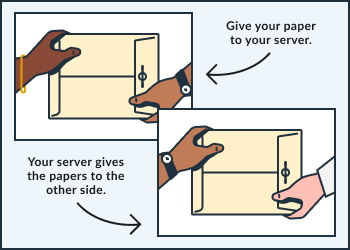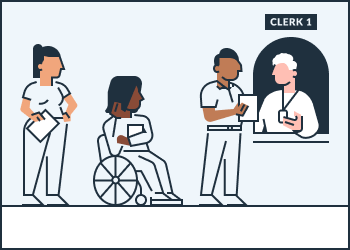Before you start
The primary way you notify the other parent is called personal service
This means another adult, not you, hands them a copy of the filed papers. This person is your server. Your server must complete a form. Then you or the server must file the form with the court to prove they delivered the papers.
You may be able to serve by mail if:
These mail options can be less reliable. Most people use personal service.
Some situations use a different process or have additional rules
Common examples of these situations include if you don't know where the other parent is or if the other person lives in another country.
How to serve in special situations
The other person has 30 days to respond
You can't move your case forward until you serve the other parent. Once they are served, they have 30 days to respond. After that, your case can move forward even if they don’t respond.
How to personally serve Petition and Summons
-
Choose a server
You can't serve papers yourself. Ask another adult – a server – to deliver the papers.
Your server must be:
-
18 or over, and
-
Not part of your case
Your server can be:
-
Someone you know
-
The county sheriff (in most, not all, counties)
-
A professional process server you hire
The sheriff charges to serve papers unless you have a fee waiver.
If the other parent is in jail or in prison: An official at the jail or prison will be your server. Contact the jail, California State prison, or federal prison to find out who does this and how to get them the documents.
If the other parent lives on a military base: If they're stationed in the United States, your server can deliver the papers to them when they're not on the base. If they're on base, their commanding officer may be able to arrange for service of the papers. Contact the military base to find out their rules. If they're not in the United States, you will need to follow other rules. The process is complicated. In general, if they're serving overseas, you may wish to speak to Self-Help Center staff or a lawyer as different rules apply. -
-
Have your server give the papers to the other parent

Your server must find the other parent and hand them these forms:
-
Copies of forms you filed with the court (except any fee waiver forms)
-
Blank Response to Petition for Custody and Support of Minor Children (form FL-270)
-
Blank Declaration Under Uniform Child Custody Jurisdiction Enforcement Act (UCCJEA) (form FL-105)
-
Any other other blank response forms required (if you filed other papers)
Your server should note the address where they gave the other parent the papers, along with the date and time. The server needs this information to fill out a Proof of Service form.
Your server can leave the papers next to them and tell them what they are. For example, your server can leave the papers on the ground next to them and say, "These are important legal papers for you."Your server needs to try delivering the papers on different days of the week and at different times. If they're never there, your server may be able to try substituted service. There are different rules for this type of service.
Get step-by-step instructions for substituted service -
-
Have your server complete the Proof of Service form

You can use Proof of Service of Summons (form FL-115).
It helps if you fill in the top part of the form with the case and court information.
Your server can then fill in the information about how, when, and where they served the papers. Your server must sign the form.
-
Copy and file the Proof of Service form

You can ask the server to make copies of the original form, file the original with the court, and return a copy to you with the court’s file-stamp on it. Or the server can return the completed form to you so you can file it with the court. If you need to file the form:
-
Make a copy of your Proof of Service form.
-
File the original and copy with the court where you filed the papers. The court will stamp and return the copy.
-
Keep the copy of the Proof of Service form for your records.
If the other parent doesn’t file a response within 30 days of being served, you can ask the court for a default. This means asking a judge to decide the case without their input.
See the process to finish your case in a default -
Petition for custody and support
What's next?
After you serve these papers, you'll wait for a response from the other parent. They have 30 days to respond. If they don't respond you can still move forward with your case.

